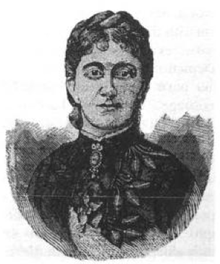Clara Bischoffsheim
| Clara de Hirsch | |
|---|---|

Portrait in 1882
|
|
| Born |
Claire Bischoffsheim June 18, 1833 Antwerp, Netherlands |
| Died | April 1, 1899 (aged 65) Paris, France |
| Nationality | Belgian |
| Spouse(s) | Maurice de Hirsch (m. 1855) |
| Parent(s) | Jonathan-Raphaël Bischoffsheim and Henriette Goldschmidt |
| Relatives |
Ferdinand-Raphaël Bischoffsheim (brother) Hortense Bischoffsheim (sister) |
Clara de Hirsch, also known as Baroness de Hirsch (née Claire Bischoffsheim; June 18, 1833 – April 1, 1899), was a Belgian businesswoman and philanthropist of the Bischoffsheim family. She was the wife of Baron Maurice de Hirsch.
Born at Antwerp, her father was Jonathan-Raphaël Bischoffsheim. Her mother was Henriette Goldschmidt (1812-1892), a sister of Solomon H. Goldschmidt, who for many years acted in the capacity of president of the Alliance Israélite Universelle.
She received a liberal education and was an accomplished linguist, able to speak and write fluently in French, German, English, and Italian. After leaving school, she acted as her father's secretary and thus became conversant not only with his business affairs, but also with his work as legislator and philanthropist. This proved to be a valuable experience during her husband's lifetime, and particularly so after his death, when she was left as sole administrator of his large estate. She was a ready writer and was her husband's only assistant while he was abroad; and at home, when his secretaries were overtaxed, she often relieved them of long and arduous duties.
She married Baron Maurice de Hirsch in 1855 and lived first in Munich, then in Brussels, and finally in Paris. Two children were born to them, a girl and a boy. The daughter died in infancy and their son Lucien in 1887, at the age of 31. After his death, the baroness never recovered, and she wore mourning apparel for the rest of her life.
Shortly after their son's death, the baron went to Constantinople and the baroness accompanied him. While there, she spent most of her time in the poor districts of the city, and, after careful investigation, distributed more than US$125,000 among needy families, without distinction of their background. Uninfluenced, Baron de Hirsch, cosmopolitan as he was, might have devoted his fortune to totally different purposes, but in philanthropic matters he yielded to his wife's judgment. It was she that gently guided his interests toward philanthropy. She would not permit money, of which the poor, persecuted, and oppressed Jews stood in so much need, to be deflected into alien channels. She determined that her husband should turn his restless energies to relieving the distress of his coreligionists.
...
Wikipedia
